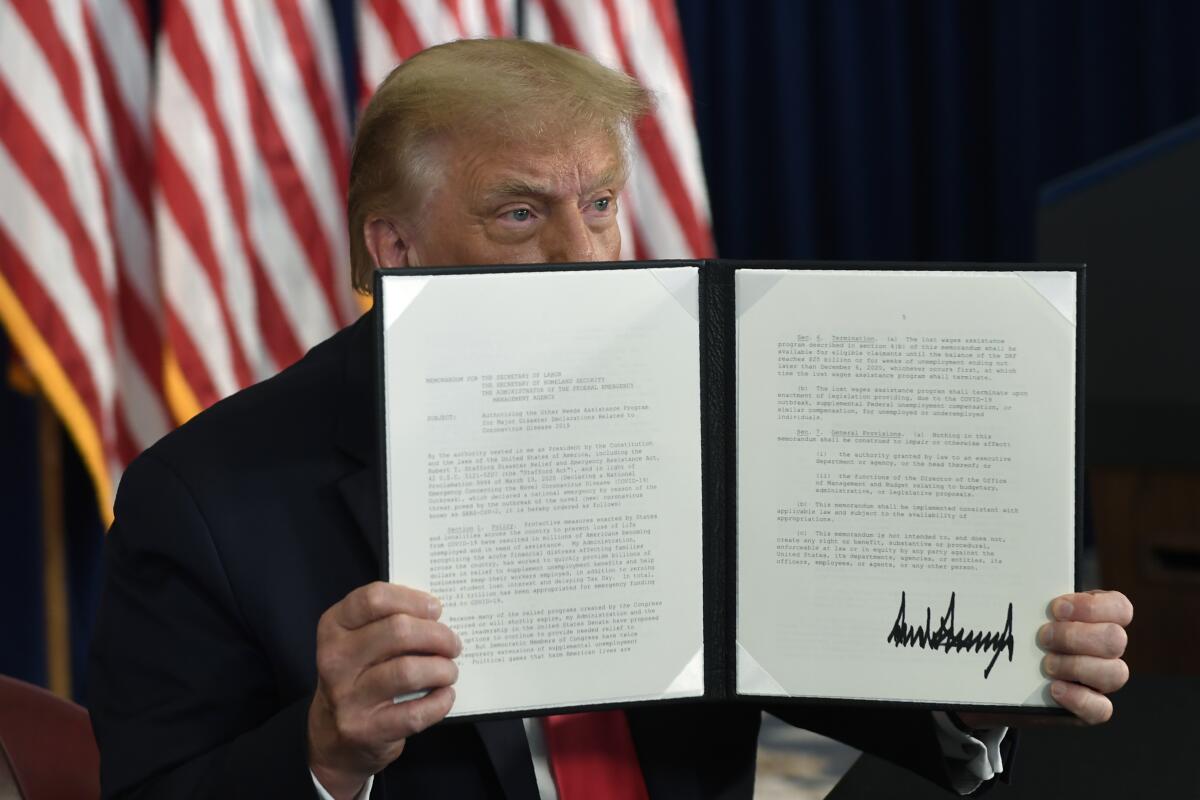Op-Ed: Trump just made another huge and illegal power grab. Be very alarmed

President Trump doesn’t understand or doesn’t care about the most basic principle of American government: Power is divided among three branches of government. The president does not possess legislative power, yet on Saturday Trump signed a series of executive orders that were clearly in the purview of the legislative, not the executive branch.
In his order, the president extended unemployment benefits, suspended the payroll tax for many workers, created an eviction moratorium and suspended student loan payments until Dec. 31. Whatever your views of these actions, they are all clearly unconstitutional, in that they exceed presidential authority. Trump is attempting to legislate through executive fiat.
Congress considered versions of all these proposals, but could not reach agreement. Rather than wait for legislators to come to some compromise they could live with, the president decided to impose his vision on the country. We should be very alarmed.
The president has many powers of his own, spelled out clearly in the Constitution. He can by executive order unilaterally change some aspects of how the executive branch of government implements its duties, but he does not possess the power to regulate private behavior or to contravene federal laws or the Constitution.
For example, the Constitution puts the power to tax and spend solely in the hands of Congress. The most that a president may do is veto a bill passed by Congress, and even that can be overridden by two-thirds of both houses of Congress. The president cannot create a tax or suspend one imposed by Congress. Yet that is exactly what President Trump has done in suspending the payroll tax by executive order.
President Trump proposed doing this to Congress, and both Democrats and Republicans thought it was a terrible idea, because it would do nothing to help those out of work, and it would take needed money from the Social Security system. After being rebuffed by Congress, Trump took the legislative reins and simply decreed the payroll tax suspended for millions of workers.
During the early 1970s, President Richard Nixon was frustrated that Congress was passing spending bills, often over his veto, for social programs he did not want to fund. President Nixon declared that he had the power to impound funds and keep them from being spent. Every court to consider his action declared the impoundment unconstitutional because it usurped congressional power. The courts have always been very clear: A president cannot suspend a tax or funding for a program created by federal law.
Likewise, Trump has no authority to extend unemployment benefits, let alone force states to pay one-quarter of the cost. Again, Democrats and Republicans were at an impasse about how to extend these benefits, so Trump just did it. Only Congress can appropriate federal funds and it has not done so. Additionally, the Supreme Court repeatedly has held that the federal government cannot force states to act, so we can expect them to be skeptical of a presidential order requiring them to spend money few states can afford.
And then there’s the eviction moratorium. Congress has power to regulate commerce among the states, and could arguably require such an action under that power. The president has no such constitutional privilege, something even he may recognize, since on the subject of evictions, all the executive order does is ask the Department of Health and Human Services to study the matter.
Some of what the president hopes to accomplish by fiat is important and worthy. For example, he extended the CARES Act, which provided student loan relief that was slated to end on Sept. 30, through Dec. 31. As an educator who sees how students struggle, I would very much like to see that happen. But it requires a law passed by Congress, not unilateral executive action.
Trump’s approach to executive power is extremely dangerous. If he continues as he has in recent days — suspending a tax enacted by Congress, extending a law set by Congress to expire — where will it end? Will any action the president wants and Congress refuses to pass simply be decreed by executive order? That’s how it’s starting to look.
The framers of the Constitution created an elegant system of checks and balances, in which it generally takes two branches of government for any major federal action. Enacting a law requires passage by both houses of Congress and either a presidential signature or a congressional override of a veto. Enforcing a law takes prosecution by the executive branch and conviction in the judiciary. Nominations for cabinet officials, federal judges, ambassadors and others take both a presidential nomination and Senate confirmation.
The system is often inefficient and sometimes fails to produce necessary action. But the alternative is to vest all powers in the president. And as James Madison warned, long ago, that is the very definition of tyranny.
Erwin Chemerinsky is dean of the UC Berkeley School of Law and a contributing writer to Opinion.
More to Read
A cure for the common opinion
Get thought-provoking perspectives with our weekly newsletter.
You may occasionally receive promotional content from the Los Angeles Times.










